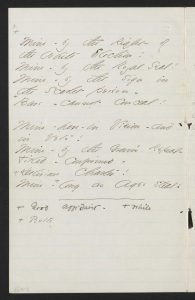Mine – by the Right of the White Election!
Mine – by the Royal Seal!
Mine – by the sign in
the Scarlet prison –
+Bars – cannot conceal!
Mine – here – in Vision – and
in Veto!
Mine – by the Grave’s Repeal –
Titled – Confirmed –
+Delirious Charter!
Mine – +long as Ages steal!
+Bolts + Good affidavit – +while
Link to EDA manuscript. Originally in Packet XIII, Mixed Fasciles, ca. 1862. First published in Poems (1890), 43. Courtesy of Houghton Library, Harvard University, Cambridge, Mass.
Readers give various and divergent contexts for this rousing, delirious declaration of possession. Perry Westbrook observes: “The choice of words echoes not only the speech of Emily’s lawyer father but also the old Puritan legalistic view of the Covenant of Grace whereby God enters into a contract with His elect.” This is the language of John Winthrop’s famous sermon, “Of Christian Charitie,” and Dickinson manages to show its continued relevance in a poem representative of Massachusetts Congregationalism.

Peggy Anderson relates it to a hymn, “Holy Bible, Book Divine,” which lends it a theological meaning. Elizabeth Philips thinks that Hawthorne’s The Scarlet Letter is a source for the poem and that the speaker is Dickinson’s version of Hester Prynne. Cynthia Wolff calls this a “heretical hymn,” arguing that a traditional one would celebrate the supremacy of God, whereas this poem “glorifies the individual’s ability to remain intact despite cosmic threats and bribes.” She finds other poems that strike a similar tone, “though few others achieve the high pitch of hypnotic intensity.”
Sharon Cameron reads “Mine by the Right of the White Election!” in the context of Fascicle 20, whose other poems are notable for their explicit sexuality. The whole fascicle, in a wonderful play on the title for Cameron’s own book (Choosing Not Choosing), is “choosing,” the advocacy of “a personal criterion–often a person’s criterion–for what is chosen and deemed acceptable, in opposition to a theological or social one.” Cameron argues that in this fascicle “the personal, the theological, and the social are first substituted, then equated, and then treated as interchangeable,” an “equivalence” demonstrated in this extraordinary poem.
Formally, this poem stands out for its use of anaphora, repetition of elements at the beginning of a line, a technique pioneered by and equated with the rebellious, always delirious poetry of Walt Whitman.


